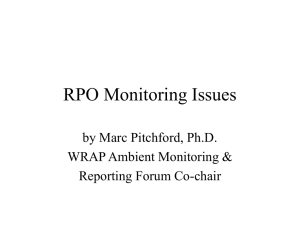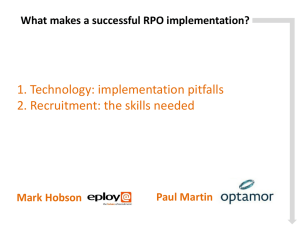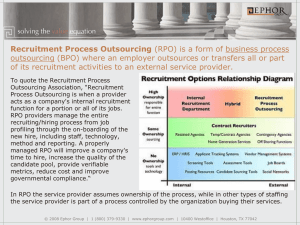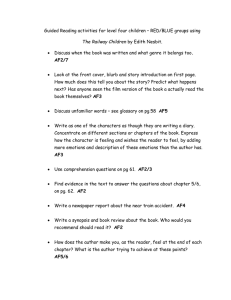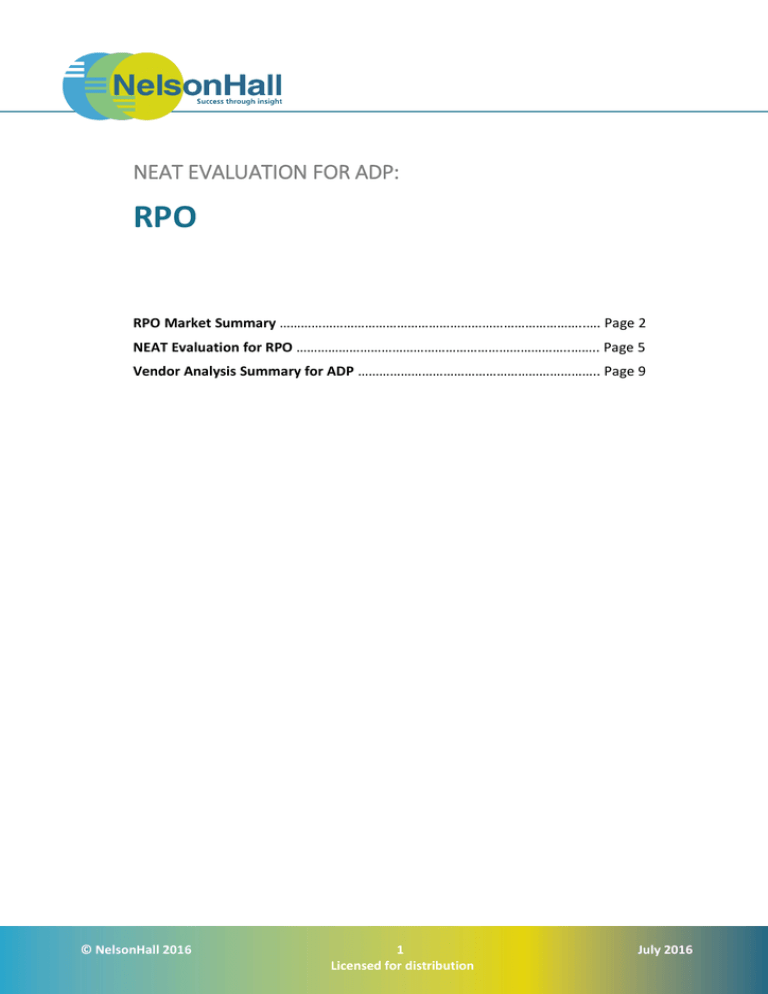
NEAT EVALUATION FOR ADP:
RPO
RPO Market Summary …………………………………………………………………………..…. Page 2
NEAT Evaluation for RPO …………………………………………………………………..…….. Page 5
Vendor Analysis Summary for ADP ………………………………………………………….. Page 9
© NelsonHall 2016
1
Licensed for distribution
July 2016
NEAT Evaluation for ADP: RPO
RPO Market Summary
Overview
A healthy market growth in RPO of +15% in 2015 has resulted from both new contract activity
and geographical expansion of services provided to existing clients.
Technological developments and mobile adoption has driven service developments as speed
to source and effective sourcing strategies are a key to success. Examples include an increase
in uptake of employer branding services, greater use of mobile sourcing, and an emergence
of the use of gamification in RPO to attract candidates. The outlook for RPO in 2016 is very
positive in light of increased hiring demands of companies, and the recent downward trend
of unemployment rates in key markets.
Recruiting companies continue to increase their focus as talent specialists as services expand
to include onboarding, year 1 engagement, employer branding, and talent community
development.
Packaged RPO offerings including technology services are increasing, particularly to support
integrating tools (where investments have not already been made) as well as to support a
single delivery experience when servicing both RPO and MSP. While vendors are principally
investing in RPO platforms and analytics platforms, technologies used to deliver services
include an increasing number of point solutions such as ATS platforms, CRM, video
interviewing platforms, labor market insight portals, and analytics/workforce planning
platforms.
Blended RPO/MSP offerings are provided by ~68% of RPO vendors; representing ~9% of total
RPO contracts. Analytics, including labor market insights, are increasingly relevant for
effective service delivery.
Although service delivery remains largely onshore, with ~80% of RPO FTEs, nearshore and
offshore centers are increasingly being used to drive economies of scale. Typical offshore
activities include sourcing, market research and back-office administration. The proportion
of service provider personnel on client sites is 32% (a decrease of 3% from 2015), as
standardization of process is driven across clients, to drive greater process effectiveness and
efficiencies.
Multi-country contracts represent ~43% of all RPO contracts, with 10% being global contracts
covering three or more regions. Vendor consolidation continued in 2015, primarily to support
geographical expansions and to expand talent management service offerings.
Buy-Side Dynamics
The top drivers of RPO are:
Scalability and agility to meet business demands
Improving performance results, primarily quality of hire
Cost reduction (primarily for first time RPO buyers)
Improving quality of hire to address poor retention
Need for transformation requiring updated tools and processes
© NelsonHall 2016
2
Licensed for distribution
July 2016
NEAT Evaluation for ADP: RPO
Broader talent management and strategy consulting capability.
The principal benefits derived from RPO are:
Reduced time to hire
Cost savings from 25%-50%, averaging 30%, largely attributed to a reduced reliance on
agencies
Improved candidate experience
Improved hiring manager satisfaction
Improved agility to support business expansions
Improved diversity and attrition
Greater visibility of workforce profile from which to drive greater workforce
effectiveness
Reduction of backlog and the development of talent pipeline to support future
workforce requirements.
High investment in an organization’s recruiting process and technology, and a related
perception of high internal expertise, are the main inhibitors to RPO adoption. Other
inhibitors include potential clients wanting to maintain control and HR being unable to make
the business case due to lack of baseline data.
Standalone RPO contracts average three years in length. There is a trend towards longer
contracts that are larger, global and more mature clients.
Market Size & Growth
The global RPO market reached $4,370m in 2015 and is forecast to grow at 16.6% per annum,
to reach $9,275m in 2020. North America is the largest RPO market, with 42% revenue share,
followed by Europe, Asia Pacific region and Latin America. The U.S. had strong growth in 2015
and is predicted to continue due to the ongoing tightening of the labor market.
The largest purchaser of RPO is the financial services sector (19% share), followed by
healthcare and pharmaceuticals, manufacturing and technology sectors.
RPO provider revenue per hire averages ~$1,360, up 1.5% y/y. Overall revenue per hire has
increased slightly as a result of RPO providers’ global expansion. Providers are extending
services to more regions and countries, and do not have the economies of scale to support
lower rates.
Success Factors
The critical success factors for RPO are:
Engaging in talent acquisition strategy and planning prior to RPO program
Defining a holistic sourcing and selection strategy
Engaging the client in strategic workforce planning discussions to support greater
visibility of future recruiting needs, and enabling sourcing decisions to support ongoing
requirements, incorporating.
© NelsonHall 2016
3
Licensed for distribution
July 2016
NEAT Evaluation for ADP: RPO
Outlook
Over the next few years:
Improving candidate experience and brand positioning will remain important, with need
for longer term workforce planning and management becoming increasingly important
RPO requirements
Analytics, workforce planning and labor market data will increasingly be available to
clients online, and will improve hiring manager visibility of the market dynamics relevant
for their industry/geography
Service offerings will develop in the areas of analytics and assimilation of labor market
data, to support sourcing choices, as well as in the increasing use of online communities,
including engagement with contingent worker communities
Further vendor consolidation and partnerships will continue as RPO companies
strengthen capability across multiple regions to meet demand for multi-country RPO.
Multi-country contracts to represent ~55% of all contracts by 2020
Blended RPO/MSP will increase to 15% of RPO contracts by 2020
Service delivery onshore will reduce to <60% of RPO FTEs by 2020.
© NelsonHall 2016
4
Licensed for distribution
July 2016
NEAT Evaluation for ADP: RPO
NEAT Evaluation for RPO
The RPO NEAT graph shows vendor evaluations for the Overall market segment, with ADP
identified as a ‘Leader’.
Buy-side organizations can access the RPO NEAT tool (Overall) here.
© NelsonHall 2016
5
Licensed for distribution
July 2016
NEAT Evaluation for ADP: RPO
NEAT Methodology & RPO Assessment Criteria
NelsonHall’s (vendor) Evaluation & Assessment Tool (NEAT) is a method by which strategic
sourcing managers can evaluate outsourcing vendors and is part of NelsonHall's Speed-toSource initiative. The NEAT tool sits at the front-end of the vendor screening process and
consists of a two-axis model: assessing vendors against their ‘ability to deliver immediate
benefit’ to buy-side organizations and their ‘ability to meet future client requirements’. The
latter axis is a pragmatic assessment of the vendor's ability to take clients on an innovation
journey over the lifetime of their next contract.
The ‘ability to deliver immediate benefit’ assessment is based on the criteria shown in Exhibit
1, typically reflecting the current maturity of the vendor’s offerings, delivery capability,
benefits achievement on behalf of clients, and customer presence.
The ‘ability to meet future client requirements’ assessment is based on the criteria shown in
Exhibit 2, and provides a measure of the extent to which the supplier is well-positioned to
support the customer journey over the life of a contract. This includes criteria such as the
level of partnership established with clients, the mechanisms in place to drive innovation, the
level of investment in the service, and the financial stability of the vendor.
The vendors covered in NelsonHall NEAT projects are typically the leaders in their fields.
However, within this context, the categorization of vendors within NelsonHall NEAT projects
is as follows:
Leaders: vendors that exhibit both a high ability relative to their peers to deliver
immediate benefit and a high capability relative to their peers to meet client future
requirements
High Achievers: vendors that exhibit a high ability relative to their peers to deliver
immediate benefit but have scope to enhance their ability to meet client future
requirements
Innovators: vendors that exhibit a high capability relative to their peers to meet client
future requirements but have scope to enhance their ability to deliver immediate benefit
Major Players: other significant vendors for this service type.
The scoring of the vendors is based on a combination of analyst assessment, principally
around measurements of the ability to deliver immediate benefit; and feedback from
interviewing of vendor clients, principally in support of measurements of levels of partnership
and ability to meet future client requirements.
© NelsonHall 2016
6
Licensed for distribution
July 2016
NEAT Evaluation for ADP: RPO
Exhibit 1
‘Ability to deliver immediate benefit’: Assessment criteria
Assessment Category
Offerings
Assessment Criteria
Employer brand development
Interview scheduling
Targeting passive candidates
Talent pool management
Talent pipelining
Managing community
Internal recruiting
Onboarding
Improved quality of hire
Improved hiring manager satisfaction
Improved candidate retention
Improved employer branding
Improved candidate experience
Improved employee diversity
Benefits Achieved
Support for new countries
Scalability to meet client needs
Improved sourcing mix
Predictive analytics for better decision-making
Analytics for improved candidate targeting & selection
Reduced time to hire
Multi-channel candidate interaction
Ability to tie results to business outcomes
Improved RPO satisfaction overall
Delivery Capability
in N.America
in U.K.
in Continental Europe
in APAC
in LATAM
Large organizations (15K+ employees)
Customer Presence
© NelsonHall 2016
Mid-size organizations (500 to 15K employees)
Small organizations (less than 500 employees)
Global presence
N. America presence
U.K. presence
Continental European presence
APAC presence
LATAM presence
Multi-country presence
7
Licensed for distribution
July 2016
NEAT Evaluation for ADP: RPO
Exhibit 2
‘Ability to meet client future requirements’: Assessment criteria
Assessment Category
Operational Requirements
Assessment Criteria
Ongoing improvement in candidate experience
Broader talent services
Ability to improve quality of hire
Support for new countries
Overall performance
Service provision
Strength of partnership
Overall Satisfaction
Service culture
Flexibility of approach
Commercial Ts & Cs
Value for money
Innovation & creativity
Ability to deliver business benefit
Ability to add extra dimension beyond contractual agreement
Ability to challenge requirements
Proactive ideas for change
Ability to improve processes
Ability to apply automation
© NelsonHall 2016
8
Licensed for distribution
July 2016
NEAT Evaluation for ADP: RPO
Vendor Analysis Summary for ADP
Overview
ADP offers RPO services across the Americas, Europe, Latin America and Asia Pacific. It began
offering RPO services in 2011 when it acquired The RightThing (founded in 2003) to expand
its HR capability. In 2015, ADP performed ~113k hires across ~90 RPO clients, and had ~1,130
employees dedicated to RPO, servicing ~23 languages and ~44 countries. All hires are for
permanent employees, with 60% management and 40% non-management hires. ADP’s RPO
services include a recruitment training and technology offering, AIRS, which has trained
~200k recruiters.
ADP offers recruitment services from workforce planning to onboarding. The most common
recruitment services bundle includes requisition development, sourcing, screening
onboarding, and technology management, with >90% of clients using these services. ADP
offers the following services to support the talent acquisition process:
Integrated background screening
I-9/E-Verify compliance management services
AIRS recruiter certification training.
ADP offers the following specialized service offerings:
Military recruiting
Executive level hiring
University recruiting
Social talent solutions.
ADP is technology agnostic and can integrate with a client’s preferred ATS. It also has its own
recruitment technology, ADP Recruiting Management (previously branded
RightThingRecruit), which is offered standalone or with recruitment services. Its proprietary
platform is adopted by ~75% of its RPO clients. The platform manages candidates throughout
the recruitment process, with functionality in support of sourcing, recruiting, CRM, applicant
tracking, onboarding and reporting.
ADP also offers a mid-market service, specifically a “one-off hiring” or “on demand” hiring
service, for businesses with <100 hires per year, using an agency approach and delivered
through the ADP Recruitment Management system. Here, ADP RPO sources candidates
remotely, and no service levels exists. The fee structure is price per hire.
Services are mostly delivered from the five most mature service centers (three in the U.S. and
two in India), though many clients are provided with some onsite services. Overall, ~60% of
resources are based in a service center, 25% are virtual and 15% of resources are based on
client sites. Outside the U.S., the majority of employees are based in local service centers.
ADP has standardized global processes using common technology, allowing it to scale, track
productivity, and send tasks to global service centers.
ADP RPO has a total of ~90 RPO clients. Its primary client base is large enterprises with >10k
employees, though it also services smaller growing companies with at least 100 hires
annually. ADP was awarded 18 RPO contracts/expansions in 2015.
© NelsonHall 2016
9
Licensed for distribution
July 2016
NEAT Evaluation for ADP: RPO
Financials
ADP’s calendar year (CY) 2015 Employer Services revenues are estimated at $8.0bn, up ~3%
y/y. Its CY 2015 HRO service line revenues are estimated at $6.5bn, up 5% y/y. NelsonHall
estimates that RPO services accounted for ~3% of ADP’s HRO services revenues in CY 2015,
or ~$195m, up ~15% y/y. The revenue distribution by region is as follows:
North America: $168m
EMEA: $12m
Asia Pacific: $4m
Latin America: $11m.
Strengths
Ability to offer a comprehensive solution including technology, training, and recruiting
services as part of its RPO offering
Integrated recruitment training (AIRS) and recruitment technology (ADP Recruitment
Management, embedded with its own CRM tools)
Ability to scale delivery with its centralized sourcing, recruitment and support model
through the use of service centers utilizing standardized global processes and common
technology, allowing ADP to scale, track productivity, and send tasks to global service
centers
Strong HR compliance team, including capability to perform background checks; ADP has
performed 10m background checks in 166+ countries
Increased opportunities to provide RPO globally using ADP’s global client base
Recruitment models to support both the mid and large markets.
Challenges
ADP has steady growth but the majority of its hires (86%) are still in North America.
Attracting and hiring RPO specialist recruiters and building European market knowledge
and expertise will be a challenge, as ADP has limited historical RPO presence in EMEA,
and there are numerous competing recruitment agencies and RPO providers
ADP is known as a payroll specialist, paying one in every six employees in the U.S. It will
continue to be challenged in marketing to potential clients that it can deliver RPO on the
same scale as payroll.
© NelsonHall 2016
10
Licensed for distribution
July 2016
NEAT Evaluation for ADP: RPO
Strategic Direction
ADP will focus its investments on enhancing service offerings, growing current client business,
attracting new accounts, and expanding global capabilities, including the following:
ADP primarily grows with clients as they expand globally. It will expand its recruitment
service in global and emerging markets, leveraging its global footprint
It will also expand its specialized service offerings such as social talent solutions, military
and university hiring, executive level services, and mid-market services
Further development of training opportunities and tools for recruiters, through AIRS
training, including certification and re-certification of all recruiters through appropriate
training programs
Ongoing investment in standard and custom reporting capabilities, to provide users with
accurate and timely information, and the flexibility to report on key SLAs/KPIs and
metrics
ADP has assigned teams to develop and maintain customer and employee satisfaction
programs, monitor results and implement solutions, to continue to provide value to
clients
Expanding services by identifying and adding optional modules and solutions within ADP
technology, including ADP products such as background screening services, I-9 and EVerify processing, work opportunity tax credits, and human capital management
Further investing in ADP Recruiting Management development and continuing
VirtualEdge to ADP Recruiting Management upgrades.
Outlook
ADP RPO continues to add new clients. Given the global market share of ADP as an HR
provider, the opportunity to penetrate the client base, and the ability to leverage ADP’s
delivery capability, NelsonHall estimates that ADP RPO will continue to experience increasing
growth in 2016.
NelsonHall expects that ADP will:
Expand current client projects by bundling additional services, and add new clients with
services such as background checks, I-9/E-Verify management, and AIRS recruiter
training
Enhance its recruiting technology, which should attract interest from current and new
clients. Efforts will focus on reporting and analytics, with predictive analytics scheduled
to be live by June 2016, an enhanced user experience, and continued integration with
ADP technology
Continue to experience double digit growth in North America, and continue to expand
globally, with current clients targeting Latin America, EMEA, and Asia Pacific.
Continue to attract mid-market clients, as more organizations look to RPO to provide
scalability.
© NelsonHall 2016
11
Licensed for distribution
July 2016
NEAT Evaluation for ADP: RPO
For more information on other NelsonHall NEAT evaluations, please contact the NelsonHall
relationship manager listed below.
Sales Enquiries
NelsonHall will be pleased to discuss how we can bring benefit to your organization. You can contact
us via the following relationship manager:
research.nelson-hall.com
Guy Saunders at guy.saunders@nelson-hall.com
Important Notice
Copyright © 2016 by NelsonHall. All rights reserved. No part of the publication may be reproduced or distributed in any form, or by any means, or
stored in a database or retrieval system, without the prior written permission of the publisher. The information provided in this report shall be
used only by the employees of and within the current corporate structure of NelsonHall’s clients, and will not be disclosed to any other organization
or person including parent, subsidiary, or affiliated organization without prior written consent of NelsonHall. NelsonHall exercises its best efforts
in preparation of the information provided in this report and believes the information contained herein to be accurate. However, NelsonHall shall
have no liability for any loss or expense that may result from incompleteness or inaccuracy of the information provided.
© NelsonHall 2016
12
Licensed for distribution
July 2016

